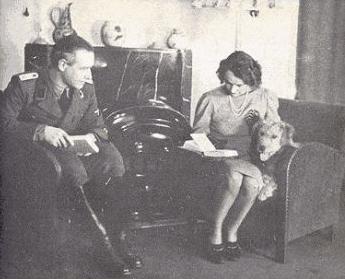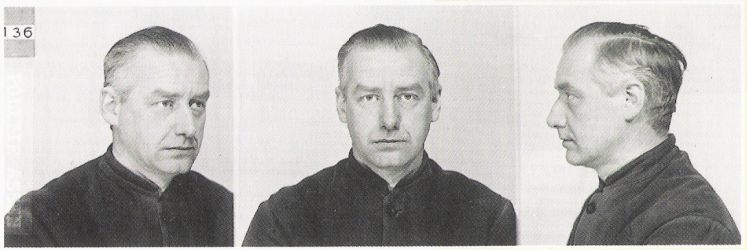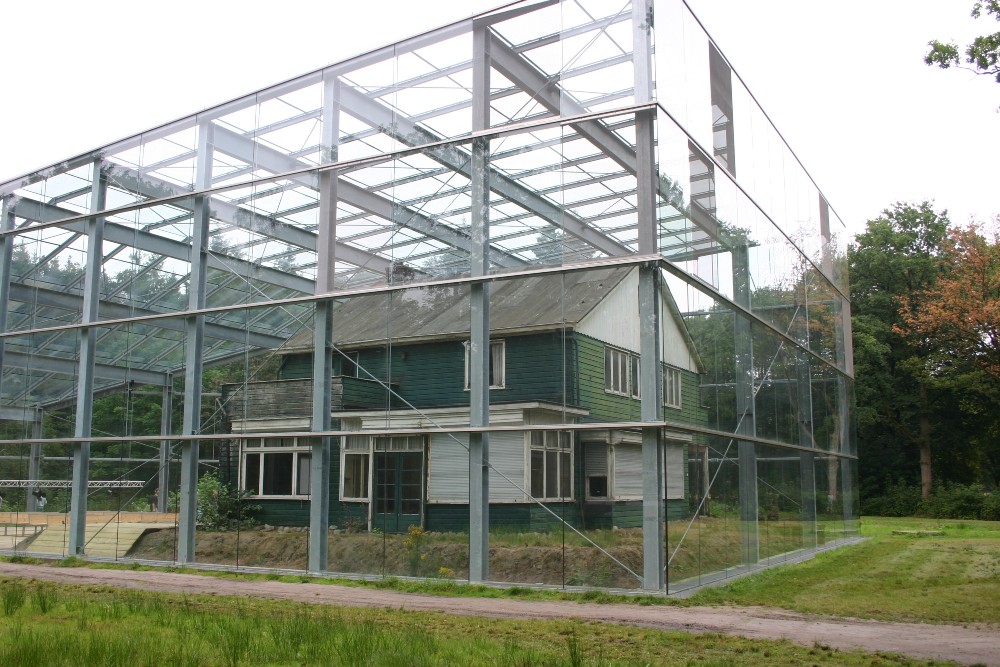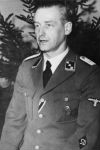Albert Gemmeker (1907-1982)
Introduction
From October 1942 until April 1945, Albert Konrad Gemmeker was camp commander at transit camp Westerbork, from where more than 101,000 Jews were deported to concentration and extermination camps in Germany and Poland. Despite the fact that Gemmeker played an important role in the “Entjüdung” (dejudification or removal of Jews) of the Netherlands, the Jewish historian Abel Herzberg sometimes had the impression that he was “as much an anti-Semite as a butcher was anti-cow”. The camp commander of Westerbork did not conduct a reign of terror, but was known as a correct person, who treated the Jews in his camp in a "humane" way.
How could someone with such an attitude participate in the extermination of the Jews or, had he never known about it, as he himself always claimed?
Careers before Westerbork
Albert Konrad Gemmeker was born September 27th, 1907 in Dusseldorf. He left school at fourteen and then worked several years at an insurance office. His job in insurance probably no longer pleased him, because, in 1927, he enlisted for training in police administration at the police academy in Bonn. After he successfully completed this training, he was hired by the police in Duisburg in 1933.
Shortly after the Nazi takeover in 1933, Gemmeker decided to become a member of the NSDAP. However it was not until May 1st 1937 that he was enrolled as a member, because the NSDAP, at that time, was quite reluctant to admit what amounted to opportunists signing up, just after the takeover. Meanwhile, in 1938, he entered the service of the Gestapo.In 1937 Gemmeker signed up for the Schutzstaffel (SS), but even then it took several years before he was accepted. On November 1st 1940 he was finally admitted to the SS with the rank of SS-Hauptscharführer. In August of that year Gemmeker was appointed as a member of the personnel department of the Sicherheitspolizei and SD in The Hague. Here he worked until, in June 1942, he became head of a hostage camp in St. Michielsgestel. Several months later, now bearing the rank of SS-Obersturmführer, he was appointed camp commander Polizeiliches Judendurchgangslager Westerbork.
Camp commander in Westerbork
From July 1st 1942 Camp Westerbork was designated a transit camp, for Jews destined, to be transported to the extermination camps in Poland. Gemmeker was appointed here, because his predecessors, Erich Deppner, Josef Hugo Dischner and inspector Bohrmann, did not perform satisfactorily. Gemmeker, a careerist, carried out his task properly however. From October 1942 to April 1945 he was responsible for the deportation of about eighty thousand Jews from the transit camp. This was carried out in a very organized manner and the Jewish prisoners cooperated without any significant protest. Daily life in Westerbork was indeed characterized by order and regularity. The Jewish prisoners themselves were, for a large part, responsible for the camp’s daily management. Gemmeker permitted all sorts of activities which in most other camps were not allowed. For instance, the camp commander actively encouraged a lot of sport activities and gave his approval for the organization of music and cabaret performances.
Compared to other camps the living conditions in Westerbork were tolerable. Although there was little privacy, poor hygienic conditions prevailed due the overcrowding of the camp and the food supply was insufficient yet Gemmeker treated his prisoners in a correct way. He did not allow mistreatment of prisoners, he was properly accountable and he was not corrupt. While many commanders and guards in other camps were feared for their ruthless and sadistic policy, Gemmeker was described by his prisoners as a gentleman, he could have been worse. According to his own words, he gave Jews "the best possible treatment under National Socialism". A prisoner described him in this way: "We once had a camp commander who kicked people to Poland, this one smiles them to Poland."
Yet the image of Gemmeker as a correct and friendly camp commander is not entirely complete. Namely, Gemmeker was also unpredictable and prone to fiery outbursts of temper. Once, while walking through the camp with Frau Hassel, his secretary and who was also his mistress, he saw a prisoner, Frederick Spier, walking close to the gate. When Spier failed to respond after Gemmeker had shouted at him that he had to leave there, he was shot by the camp commander with a shotgun. Spier was hit by the hail-shot and ended up in the camp hospital. Gemmeker’s mistress scolded him: the next time he had to warn her first so she could protect her ears. Unlike Gemmeker, his mistress did measure up more to the image of the typical camp executioner. She berated prisoners when Gemmeker was absent, and handed out very heavy punishments. Due to this brutal behavior, Frau Hassel was known as the “the evil Gemmeker” and by the prisoners she was even called “evil spirit” or “devil”.
Another incident, showing the less friendly side of Gemmeker, took place in May 1944. Some prisoners had the privilege of keeping a pet dog in the camp, but Gemmeker put an end to this when his own dog was harassed by a few stray dogs. All dogs of the camp prisoners had to be killed. It was actually useless to send in requests for retaining a dog. Prisoners who evaded this order risked punishment transport. This was the most feared penalty, because the rumors about what happened to Jews in the east were sinister.
Deportations
Some prisoners were able to postpone it, but, eventually nobody in transit camp Westerbork could escape from the feared deportations. Although Gemmeker left the composition of the transport lists largely to the Jewish camp directors, he had the authority to determine who would and who would not be abducted to the east. Sometimes he made use of this power. Once it happened that he put a woman on transport, who was only taking another woman to the platform for deportation, but said aloud: "Is this what the civilized world is all about?".
What did Gemmeker think of the Jews and their deportation in which he was so closely involved? Before he was sent to the Netherlands, he had hardly had experience of Jewish citizens, but it seems that he took all anti-Jewish propaganda of the Nazis as gospel truth. After the war, in his interrogation by a Dutch police officer, he said: "In general I was not sympathetic to the Jews. As a rule, the Jews had good jobs, which they did abuse and exploit at the expense of the rest of the population, so, actually, the rest of the population was being parasitized. I, therefore, fully agreed that the Jews had to disappear from important positions in public and business life”. Because the Jews were a danger for German warfare, he found it necessary that measures were taken against them. He considered the deportations "unpleasant, but necessary." They were "kriegsnotwendig". He admitted finding it degrading that the Jews were transported in cattle cars, but to the Dutch police he asserted that there was no better equipment available and that he was told that the transport of soldiers took place in the same way.
The last deportation from Westerbork took place on September 13th 1944. About half a year later, on April 11th, 1945, Gemmeker left camp Westerbork, together with some of his staff members. A day later, the transit camp was liberated by the Canadians. Meanwhile, Gemmeker had reached Amsterdam, by the Afsluitdijk causeway. Here he worked, for several weeks, as Verwaltungsführer, probably for the Zentralstelle für jüdische Auswanderung, the agency that was responsible for the deportation of Jews from the Netherlands. When the Dutch capital was liberated in May 1945, Gemmeker and his colleagues were arrested and put in prison. Gemmeker was transferred to the prison in Assen where he was interrogated for some months. Subsequently, pending his trial, he himself became imprisoned in Westerbork, now used as an internment camp for NSB members, collaborators and Germans.
In late 1948, Gemmeker was transferred to Assen for trial. The prosecutor demanded a sentence of twelve years confinement for Gemmeker, but in January 1949 he was sentenced to ten years imprisonment, it being accepted in mitigation, that he had treated prisoners in camp Westerbork properly.
Blame
The mild sentence for Gemmeker, especially compared with the sentences meted out to the majority of his fellow camp commanders, arose, because Gemmeker’s accusers could not prove that he was an accomplice to mass murder. If one had been able to prove his complicity, he probably would have been sentenced to death. Gemmeker remained consistent in denying that he knew anything of what happened to the Jews in Poland. He alleged that, although he had verified the rumors about the extermination of Jews, his superiors had told him not to believe this "atrocity propaganda" . Gemmeker also claimed that he had asked a railway guard, who regularly traveled to Auschwitz, what happened to the Jews in Auschwitz. This guard, Gemmeker alleged however, couldn’t tell him anything, because "transportation was taken over by camp staff, an officer and his staff at a station before the Auschwitz camp” and the guard himself had “never seen the camp".
The veracity of this statement is very doubtful. In the TV program “Andere Tijden" of April 9th, 2000 NIOD researcher Johannes Houwink ten Cate called this demonstrably incorrect. According to ten Cate it is certain that the train guards traveled to the platform at Auschwitz-Birkenau, where the selection for the gas chambers took place. From this, ten Cate concludes that the train guards certainly must have known of what was happening to those Jews and that they would undoubtedly have informed a camp commander about it, on inquiry. Prof. Dr. Lou de Jong arrived at the same conclusion in "Het Koninkrijk der Nederlanden in de Tweede Wereldoorlog" . According to this historian, Gemmeker would certainly have known about the extermination of Jews from the train guards, "who, according to him, knew about it, could smell it".
In order to avoid panic and have the deportation process proceed smoothly, Jews were told that they were being transferred to camps in the east. Gemmeker claimed that he believed this as well. During his interrogation in 1948, he stated that he considered Auschwitz, during the war, to be a big city, with factories, orphanages and enormous hospitals. This made his defense completely “watertight”, because he could thereby explain the deportations of little children, the elderly and patients from the infirmary.
Amnesty
Gemmeker obtained an early release on account of good behavior, having spent six of the ten years in prison. He settled back in his hometown of Düsseldorf, yet the past did not let him entirely alone, for still the mystery surrounding his complicity was not yet resolved.
Was it really the truth that, during the war, Gemmeker has known nothing of the fact that almost all people who were deported from his camp were killed?
In an interview broadcast by the Norddeutsche Rundfunk in 1959, he returned with the same thoughtful arguments, which pled him free earlier. What is remarkable is that in that same interview he also repudiated his earlier opinion about Jews.
He acknowledged that anti-Semitism is based on prejudice and had come to the conclusion that it is, therefore, wrong.
A sincere repentance? Or, as ten Cate in "Andere Tijden" suggested, a turnaround that just came from the fear that after his imprisonment in the Netherlands he also would have to stand trial in Germany?
In the early seventies the German justice system started a new investigation into Gemmeker, but once again evidence was insufficient to sentence the former camp commander for a second time. When Gemmeker died in 1982, the mystery remained unresolved.
Definitielijst
- Auschwitz-Birkenau
- The largest German concentration camp, located in Poland. Liberated on 26 January 1945. An estimated 1,1 million people, mainly Jews, perished here mainly in the gas chambers.
- Jews
- Middle Eastern people with own religion that lived in Palestine. They distinguished themselves by their strong monotheism and the strict observance of the Law and tradition. During World War 2 the Jewish people were ruthlessly persecuted and annihilated by the German Nazis. . An estimated 6,000,000 Jews were exterminated.
- National Socialism
- A political ideology drawn up by Hitler based on the superiority of the German race, the leader principle and fierce nationalism that was fed by the hard Peace of Versailles. National socialism was anti-democratic and racist. The doctrine was elaborated in Mein Kampf and organised in the NSDAP. From 1933 to 1945 National socialism was the basis of totalitarian Germany.
- Nazi
- Abbreviation of a national socialist.
- NSB
- National Socialist Movement. Dutch political party sympathising with the Nazis.
- propaganda
- Often misleading information used to gain support among supporters or to gain support. Often used to accomplish ideas and political goals.
- Schutzstaffel (SS)
- The Schutzstaffel commanded by Heinrich Himmler was a very powerful organisation within the Third Reich. The original goal of the SS was to protect Adolf Hitler and other Nazi’s but soon the SS was deployed for several military, security and police tasks. The SS guarded inter alia the concentration camps and manned the Einzatzgruppen. The armed branch of the SS was the Waffen-SS.
- Socialism
- Political ideology aiming at slight or no class differences. Means of production are owned by the state. Evolved as a response to capitalism. Karl Marx tried to substantiate socialism scientific.
Images
 Camp commander Gemmeker and Frau Hassel. Source: J. Presser, Ondergang, dbnl.org.
Camp commander Gemmeker and Frau Hassel. Source: J. Presser, Ondergang, dbnl.org. Home of Albert Konrad Gemmeker at Westerbork. Source: Bureau Funeralia / René ten Dam.
Home of Albert Konrad Gemmeker at Westerbork. Source: Bureau Funeralia / René ten Dam.Information
- Article by:
- Kevin Prenger
- Translated by:
- Chrit Houben
- Published on:
- 19-01-2025
- Feedback?
- Send it!
Related sights
Related books
Sources
- KOK, R. & SOMERS, E., Nederland en de Tweede Wereldoorlog, Waanders, Zwolle, 2005.
- PRESSER, J., Ondergang, Aspekt, Soesterberg, 2005.
- www.ushmm.org
- Andere Tijden - 9 april 2000










